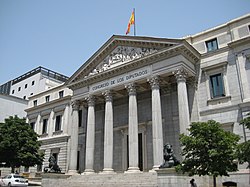Ispaniya
(an turo daga Spain)
Hispania ko Ispaniya[1] ko Spain (da Turanci), ƙasa ce, da ke a nahiyar Turai. Hispania tana da yawan fili kimanin kilomita arabba'i 505,990. Hispania tana da yawan jama'a 46,468,102, bisa ga ƙidayar yawan jama'a a shekarar ta 2016. Hispania tana da iyaka da ƙasashen kamar su Faransa, Portugal da kuma Andorra. Babban birnin Hispania, Madrid ne.
| Reino de España (es) | |||||
|
|||||
|
| |||||
| Take |
Marcha Real (en) | ||||
|
| |||||
| Kirari |
«Plus ultra (en) | ||||
| Suna saboda |
Hispania (en) | ||||
| Wuri | |||||
| |||||
| Babban birni | Madrid | ||||
| Yawan mutane | |||||
| Faɗi | 47,415,750 (2021) | ||||
| • Yawan mutane | 93.71 mazaunan/km² | ||||
| Harshen gwamnati | Yaren Sifen | ||||
| Addini |
non-denominational (en) | ||||
| Labarin ƙasa | |||||
| Bangare na |
Turai, Tarayyar Turai, Pyrenees–Mediterranean Euroregion (en) | ||||
| Yawan fili | 505,990 km² | ||||
| Wuri a ina ko kusa da wace teku |
Tekun Atalanta, Bahar Rum, Cantabrian Sea (en) | ||||
| Wuri mafi tsayi |
Teide (en) | ||||
| Wuri mafi ƙasa |
Mina de Las Cruces (en) | ||||
| Sun raba iyaka da | |||||
| Bayanan tarihi | |||||
| Mabiyi |
Hispanic Monarchy (en) | ||||
|
14 ga Maris, 1516: Sarauta has cause (en) 1715 (<1715): Spanish House of Bourbon (en) 19 ga Maris, 1812 ↔ 4 Mayu 1814: Spanish Constitution of 1812 (en) 9 Disamba 1931 ↔ 1 ga Afirilu, 1939: Spanish Constitution of 1931 (en) 29 Disamba 1978: Constitution of Spain (en) | |||||
| Muhimman sha'ani |
Nueva Planta decrees (en) Spanish Constitution of 1812 (en) Spanish Constitution of 1931 (en) constitution of Spain (en) Spanish transition to democracy (en) Spanish Civil War (en) Carlist Wars (en) Third Council of Toledo (en) first arrival of Christopher Columbus to America (en) Reconquista (en) Peninsular War (en) | ||||
| Ranakun huta |
New Year's Day (en) International Workers' Day (en) Assumption of Mary (en) Spanish national day (en) Spanish Day of the Constitution (en) Immaculate Conception of Mary (en) Kirsimeti (December 25 (en) Epiphany (en) Good Friday (en) | ||||
| Tsarin Siyasa | |||||
| Tsarin gwamnati |
parliamentary monarchy (en) | ||||
| Majalisar zartarwa |
Government of Spain (en) | ||||
| Gangar majalisa |
Cortes Generales (en) | ||||
| • Sarkin Ispaniya | Felipe na shida (19 ga Yuni, 2014) | ||||
| • Firaministan Ispaniya | Pedro Sánchez (2 ga Yuni, 2018) | ||||
| Majalisar shariar ƙoli |
Supreme Court of Spain (en) | ||||
| Ikonomi | |||||
| Nominal GDP (en) | 1,427,380,681,295 $ (2021) | ||||
| Nominal GDP per capita (en) | 29,993.06 $ (2019) | ||||
| Kuɗi |
Euro (en) | ||||
| Bayanan Tuntuɓa | |||||
| Kasancewa a yanki na lokaci |
UTC+01:00 UTC+02:00 (en) UTC±00:00 (en) UTC+01:00 (a Canary Islands, daylight saving time (en) Europe/Madrid (en) | ||||
| Suna ta yanar gizo |
.es (mul) | ||||
| Tsarin lamba ta kiran tarho | +34 | ||||
| Lambar taimakon gaggawa |
*#06#, 061 (en) | ||||
| Lambar ƙasa | ES | ||||
| NUTS code | ES | ||||
| Wasu abun | |||||
|
| |||||
| Yanar gizo | administracion.gob.es | ||||
|
| |||||







Hispania ta samu yancin kai a shekara ta 1479, saboda haɗewar daulocin Castilla da Aragon.
Hotuna
gyara sashe-
Barcelona (Hotel Vela)
-
Birini Barcelona daga Montjuic
-
Tashar jirgin kasa ta França Barcelona.
-
Aquarium Barcelona
-
Arc de Triomf Barcelona
-
Kotun Allah ya isa da ke birnin Madrid
-
Filin jirgin Sama, Ispaniya
Manazarta
gyara sashe| Turai | |||
| Belarus • Bulgairiya • Kazech • Hungariya • Moldufiniya • Poland • Romainiya • Rash • Slofakiya • Ukraniya | Denmark • Istoniya • Finland • Iceland • Ireland • Laitfiya • Lithuania • Norway • Sweden • United Kingdom | ||
| Albaniya • Andorra • Herzegovina • Kroatiya • Girka • Italiya • Masadoiniya • Malta • Montenegro • Portugal • San Marino • Serbiya • Sloveniya • Hispania • Vatican | Austriya • Beljik • Faransa • Jamus • Liechtenstein • Luksamburg • Monaco • Holand • Switzerland | ||
| Kazakhstan | |||
Wannan Muƙalar guntuwa ce: tana buƙatar a inganta ta, kuna iya gyara ta.



